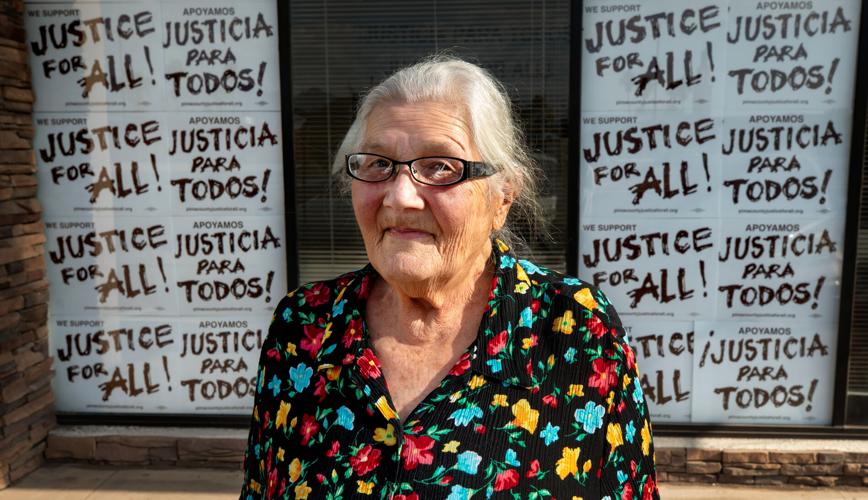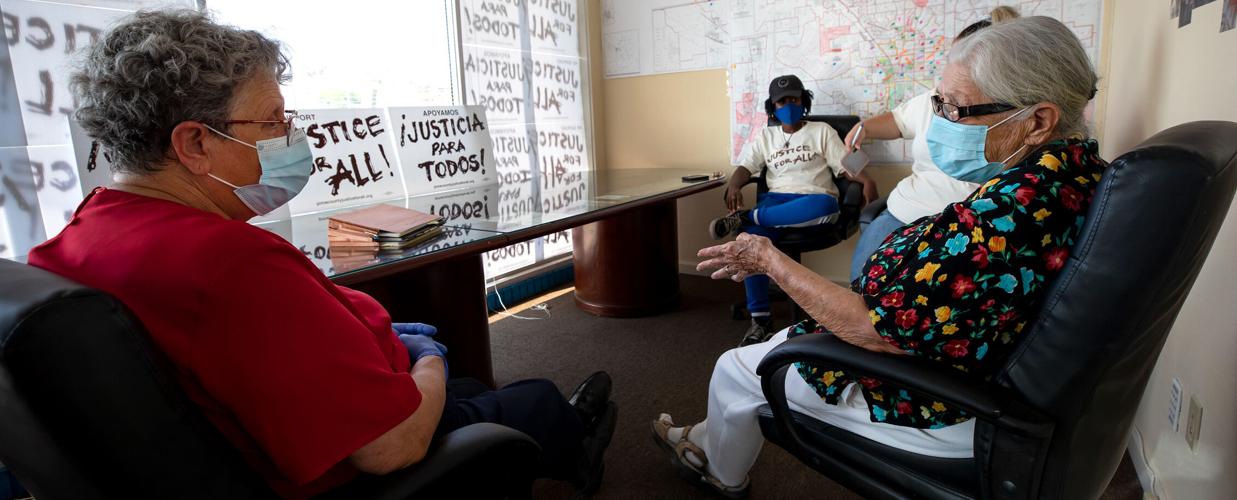Raquel Rubio-Goldsmith only just qualified for this series on retirees serving the community: At 85, this Chicana historian and border, women’s and civil-rights activist retired only months ago.
For the third time.
In December 1999, she retired as head of Pima Community College’s ethnic studies program.
She retired twice — in 2010 and again in 2020 — as co-director of the University of Arizona’s Binational Migration Institute.
Which frees her up for other causes —Coalición de Derechos Humanos, Fundación México, serving on the board of the Little Chapel of All Nations, supervising a couple of grad students, serving an advisory role in the Binational Institute and the Justice for All campaign.
This “mother of ethnic studies” in Tucson may have stepped down from paid work but clearly hasn’t stepped away from working.
In her near north-side home recently, Rubio-Goldsmith talked about her intertwined personal and professional lives. In many ways, she has lived the racial and social injustices she continues to call out.
The first of nine children of Mexican immigrants in Douglas, young Raquel first confronted racial segregation entering first grade, when her white neighborhood friends were sent to one school and she was sent to another mere blocks apart.
“It taught me a heavy lesson,” Rubio-Goldsmith told Jeff Bannister in a Journal of the Southwest interview last year.
Heavy lessons continued. Although she was fluent in English, she was automatically placed in a limited-English class. In junior high, she was refused permission to transfer into an Anglo study hall so she could play in the orchestra. She was eventually allowed to drop her Mexican-section spelling class. But she couldn’t attend Anglo study hall.
In high school, she — like the other Mexican-American students — was counseled into vocational classes.
“So I took typing, shorthand” to qualify as a secretary, but she also took a full load of college prep courses — enough, in fact, to skip ahead two years and graduate at age 15. She relates one final, painful race-related experience in band (“the one thing I loved”): While she and other Douglas Senior High School musicians were waiting for their Band Day competition on the UA campus, a group of Tucson High Band members began taunting them, calling them “greasers and beaners.”
“A fistfight broke out,” says Rubio-Goldsmith, and Douglas’ band was kicked out of Band Day. Tucson High’s wasn’t.
“My family always spoke a lot about injustice,” Rubio-Goldsmith muses. “Justice is something people seek. That’s why I studied law.”
She did her undergraduate and graduate work at the Autonomous University in Mexico City, where she got to know artist Frida Kahlo, saw her first student demonstration (recognizing Diego Rivera in the crowd), encountered injustice in the rigid Mexican class system, and studied philosophy and law.
Experiences in her early adulthood strengthened Rubio-Goldsmith’s own resolve to “organize the world in a new and just way.” In 1961, her husband, Barclay Goldsmith, took a U.S. State Department job in Mérida, Yucatán. She had seen poverty before, but nothing like that of the Indigenous people there. Later, when they returned to the U.S., she encountered virulent racism against Blacks in the Pittsburgh ghetto Hazelwood.
“The segregation was phenomenal,” she says.
Although Rubio-Goldsmith had never wanted to be a teacher (she wanted “to do, not teach”) she realized that “if we were ever going to do anything to change, it had to be through education.”
So it was, she said, “God-sent” that in 1969 her husband was hired as director of the Arizona Theater Company. The couple, with their two sons, came to Tucson, and she was hired by Pima Community College.
Newly founded, Pima at the time was jettisoning old assumptions about learning. Rubio-Goldsmith was hired to teach history but was tapped to head up the new ethnic studies program. She quickly turned to constituent communities for instructors: She drafted a Yaqui who knew tribal lore to teach Yaqui history, a Tohono O’odham to teach O’odham history, and she persuaded the University of Arizona to accept transfer credit for them. They held workshops with wide-ranging debates and discussions.
“It was a heady time,” she says.
Border activist and retired PCC history teacher Guadalupe Castillo said that Rubio-Goldsmith brought with her the 1960s and ‘70s civil-rights energies from the world outside Tucson. She reached into the community and drew students to Pima — often in bilingual classes — offering teaching assistants and volunteers in schools, for example, access to college degrees. She remains a “devoted mentor to young people,” Castillo said.
But policies change, politics impinge, attitudes change. She retired after 30 years.
In the meantime, she had been volunteering with the Manzo Area Council War on Poverty program. The program, led by attorney Margo Cowan with Castillo, Rubio-Goldsmith, and then Isabel Garcia (the group to be known as “Las Mujeres de Manzo”), assisted the community with practical application services. But it soon became clear that what was needed was assistance in regularizing immigrant status. They helped many navigate immigration bureaucracy until April 1976, when police and Border Patrol swept in and confiscated the files of 500 clients and summarily deported hundreds of them.
Rubio-Goldsmith said she chose to leave the hands-on, human-rights and immigrant-rights work to co-found the UA’s academic, research-based U.S. Mexican-American Studies Binational Migration Institute so that she could help find the data to back up the immigration works she had been doing with the Manzo program. It was 2004, and U.S. border policies were forcing migrants to cross the desert, where they were dying in unprecedented numbers, she said. But “the stories (of deaths) were anecdotal,” which is where the institute comes in, said Rubio-Goldsmith. To argue for change, they needed hard evidence and data, which the institute would provide through its research.
Since then, the institute has researched, published, presented and centered students in its mission to examine the impact of enforcement practices of the American and Mexican governments on Latinos in the Arizona-Sonora region.
And now she has “retired” to Justice for All, a campaign to put on the 2022 ballot an initiative to grant undocumented people legal representation in immigrant court.
As Cowan points out in the Justice for All website (where you can see all the “Mujeres de Manzo”), “In criminal court, if you are facing just one day in jail” and can’t afford a lawyer, the courts supply one. Not so in immigration court. That is fundamentally unjust, they claim. Legal defense should be a right in this country.
“We are at a time,” Rubio-Goldsmith asserts in the video, “when we must fight for justice for all.”





